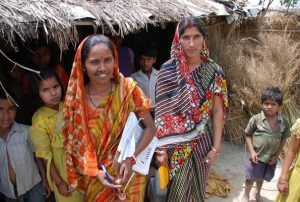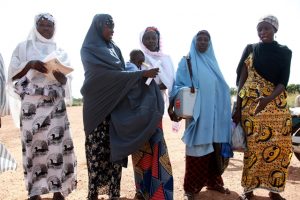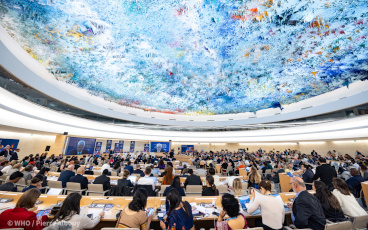Celebrating the female vaccinator
International Women’s Day

F. Caillette/WHO
7 March, 2012 – Out there in two continents right now, there is a dedicated, yet largely unacknowledged army of women devoted to ensuring that polio is eradicated. Dressed in uniforms of fluttering burkhas in vivid sky blue or sober black, jewel tone saris or vibrant African prints, these women walk from door to door, talking to families, giving vaccine – all to protect children against polio.
In many countries, a vaccination team cannot function without a female vaccinator. In conservative areas, where male vaccinators can not enter the house, having a woman on the team can mean the difference between a closed door or a welcoming invitation into the home. In northern Pakistan, Afghanistan or northern India, the sight of burkha-clad women tramping through the alleys with their clipboards, vaccinating children, conducting social mobilization with mothers and recording coverage is a heartening signal of how these women and their communities value the health of their children.
Able to speak woman to woman, mother to mother or grandmother to mother, female vaccinators can hold a great degree of sway. By showing that they are willing to have their own children vaccinated against polio, vaccinators who are mothers demonstrate to wary parents that they have the children’s best interests at heart. And in parts of Nigeria, where the wise words of older women are greatly respected, the inclusion of senior women in vaccination teams is having a positive effect on the number of parents who want their children to be vaccinated.
The role that women vaccinators and social mobilizers play in polio eradication is not only of benefit for parents and caregivers. For the women themselves, the programme has offered a unique opportunity to have a respected voice as health providers in their community, and to find professional fulfillment through something beyond their role as wife and mother.

In India alone, it is estimated that a staggering 80-85% of the 2.3 million vaccinators involved during each round of National Immunization Days are female workers – this includes Auxiliary Nurse Midwives, Accredited Social Health Activists (known as ASHAs), front-line workers of the social welfare department (Anganwadi workers) and volunteers. In addition, nearly 70% of the 155,000 supervisors that oversee the work of these vaccinators are female. In the once traditional polio reservoirs of Bihar and Uttar Pradesh, more than 92% of the 128,000 vaccination teams have at least one female vaccinator as a team-member, while UNICEF’s 8000-strong Social Mobilization Network, which goes door to door spreading messages about polio and routine immunization, exclusive breast-feeding, nutrition, handwashing and diarrhea treatment, is almost exclusively made up of women.
So on 8 March, as the world celebrates International Women’s Day, let us take some time to think of these remarkable women and the work they are doing to ensure that children everywhere are safe from the threat of polio.













